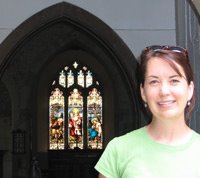43: Home and family
They had their hints of dysfunction. (Is any family without them?) James, the oldest, could be demanding and officious. Edward, not unlike his mother, developed a talent for imagining himself ill. Charming Henry had some difficulty making his way in the world, and at one point went bankrupt and lost some valuable family holdings. If Jane and Cassandra had a weakness it was that they were generally thought to have rushed into spinsterhood, hurrying themselves into middle age. But all the children remained close throughout their lives.
There were eight in all, six before Jane and one after her, all delivered with no anesthesia and remarkably with no problems. Well, perhaps there were problems with George, the second. Many people who talk about the Austen family say there were only seven children, and I think it is because they are forgetting George. We don’t know exactly what was wrong with him, but he appears to have been learning disabled in some way, and had fits. It’s possible he was deaf and dumb. The Austens sent him to live in Monk Sherborne, a neighboring village, with the same people who cared for Mrs. Austen’s younger brother, who struggled with similar difficulties. The Austen parents seem to have visited George and loved him, but he was apparently not a great part of their lives.
Actually, all of the children were sent out when they were small to stay with a family in the village, after about three months of breastfeeding and careful attention. (Claire Tomalin details this in Jane Austen: A Life.) The Austens visited the babies every day during their 12- or 18-month stay with the nurse. The village is so small, it’s easy to believe that the little ones still saw their parents all the time. Though it sounds cruel to us, it seems to have been an accepted part of raising chidren then. As Tomalin points out, they did not understand the significant bond between mother and child. Perhaps even if they did understand, they would have done it anyway, as a means of survival—running a household, farm and school along with a growing family, without any extended family nearby, you can imagine the couple needed help.
So there they were—James, Edward, Henry, Cassandra, Frank, Jane and Charles—with a mother who loved to write charming little poems and a father who could teach them all they would ever need to know of Greek and Latin.



2 Comments:
I'm a very new reader to your blog/blook (only yesterday). The only way I can figure to navigate, is to read your entries backwards. So, for instance, I saw your photos of the copse of trees before I read the entry describing your walk. I will be delighted to catch up this way, but of course prefer reading a story from beginning to end. Am I missing an easier way to do this?
All the best!
Thanks for your note, Sarah. I'm always delighted and a bit amazed when people want to catch up on the whole thing! Right now, unfortunately, the only way to do that is what you described -- reading through everything backward. But I'm hoping to post the first section of the book/blook as a pdf file that people could download, print and read. It would cover posts 1-37, I think. Hoping to get that up later this week, or early next.
cheers!
Lori
Post a Comment
<< Home